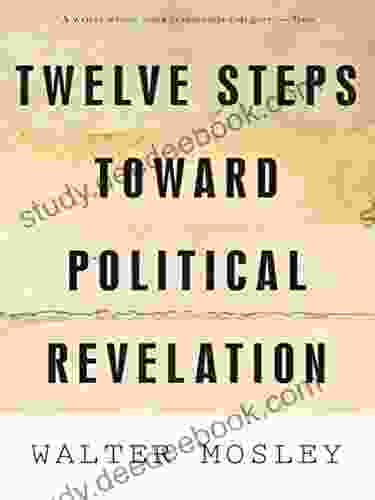The Bigger the Lie, the More People Will Believe It: Uncovering the Psychology of Misinformation


In the realm of human communication, truth and falsehood have always been intertwined. However, in the age of rapid digital information dissemination, the spread of misinformation has reached unprecedented levels, posing a significant threat to our ability to make informed decisions and maintain a healthy society. One of the most intriguing and disconcerting aspects of misinformation is the phenomenon known as the "big lie" theory, which suggests that the more audacious and outlandish a lie is, the more people are likely to believe it. This article delves into the fascinating psychological mechanisms that underlie this theory, exploring the cognitive biases, emotional appeals, and social dynamics that contribute to its effectiveness.
5 out of 5
| Language | : | English |
| File size | : | 2475 KB |
| Text-to-Speech | : | Enabled |
| Enhanced typesetting | : | Enabled |
| Word Wise | : | Enabled |
| Print length | : | 47 pages |
| Lending | : | Enabled |
| Screen Reader | : | Supported |
Cognitive Biases
One of the primary reasons why people may be more inclined to believe bigger lies lies in the existence of certain cognitive biases. These are mental shortcuts that our brains use to process information quickly and efficiently, but they can also lead us astray when it comes to evaluating the credibility of claims.
Confirmation Bias
Confirmation bias is a tendency to seek out and interpret information that confirms our existing beliefs, while ignoring or downplaying evidence that contradicts them. This means that if we are already predisposed to believe something, we are more likely to accept even the most outlandish claims that support that belief.
Belief Perseverance
Once we have adopted a belief, belief perseverance bias makes us highly resistant to changing it, even when presented with compelling evidence to the contrary. This can make us more likely to cling to false or misleading information, even when it becomes increasingly clear that it is not true.
Illusory Truth Effect
Repeated exposure to a claim, even if it is false, can increase our perceived truthfulness of it. This phenomenon is known as the illusory truth effect and can be particularly effective when the claim is presented in a confident and authoritative manner.
Emotional Appeals
In addition to cognitive biases, emotions also play a significant role in shaping our susceptibility to misinformation. Fear, anger, and anxiety can all make us more likely to accept claims that confirm our existing fears or provide us with a sense of comfort or security.
Fear-Mongering
Fear-mongering tactics are often used to spread misinformation, especially in politically charged environments. By exploiting people's fears and insecurities, purveyors of misinformation can manipulate them into believing outlandish claims that offer them a sense of protection or control.
Emotional Contagion
Emotions can spread from one person to another, a phenomenon known as emotional contagion. This means that if we are exposed to someone who is expressing strong emotions about a particular claim, we are more likely to adopt those same emotions and be more receptive to the claim itself.
Social Dynamics
Finally, social dynamics also play a role in the spread of misinformation. Groupthink, social pressure, and the desire to belong can all influence our willingness to accept and believe false claims.
Groupthink
Groupthink occurs when individuals within a group suppress their own doubts and conform to the majority opinion. This can lead to situations where even the most outrageous claims can be accepted if they are endorsed by the group.
Social Pressure
Social pressure can also lead us to accept misinformation, even if we do not personally believe it. We may feel pressured to conform to the beliefs of our peers, colleagues, or family members, even if we know those beliefs are not true.
Desire to Belong
Our desire to belong to a group can also make us more susceptible to misinformation. We may be more likely to accept claims that are endorsed by our group, even if they are not supported by facts, in order to maintain our sense of belonging and avoid social isolation.
Consequences of Misinformation
The spread of misinformation has far-reaching consequences for our society. It can undermine trust in institutions, damage relationships, and even lead to violence and civil unrest.
Erosion of Trust
Misinformation can erode trust in governments, media outlets, and other institutions. When people are repeatedly exposed to false and misleading claims, they become less likely to believe anything they hear or read, which can make it difficult for them to make informed decisions and participate effectively in society.
Damaged Relationships
Misinformation can also damage relationships between individuals and groups. When people believe different and conflicting narratives about important issues, it can create division and mistrust. This can make it difficult to have productive conversations and find common ground, which is essential for a healthy and inclusive society.
Violence and Civil Unrest
In extreme cases, misinformation can even lead to violence and civil unrest. This is especially true when false claims are used to incite fear, anger, and hatred against particular groups of people. The spread of misinformation about the 2020 U.S. presidential election, for example, has been linked to the January 6th attack on the U.S. Capitol.
Combating Misinformation
Given the significant consequences of misinformation, it is essential that we take steps to combat its spread. There are a number of things we can do to protect ourselves and our communities from the harmful effects of false and misleading claims.
Critical Thinking
The most effective way to combat misinformation is to develop critical thinking skills. We need to be able to evaluate the credibility of claims, identify biases, and recognize emotional appeals. We should also be aware of our own cognitive biases and be mindful of how they might influence our judgement.
Media Literacy
Media literacy is another important tool in the fight against misinformation. We need to be able to understand how media works, how it can be used to manipulate our emotions, and how to identify and verify the accuracy of information. We should be skeptical of claims that are presented without evidence and be willing to challenge claims that seem too good to be true.
Fact-Checking
Fact-checking is an essential tool for verifying the accuracy of information. There are a number of reputable fact-checking organizations that can help you to separate fact from fiction. We should make it a habit to fact-check claims before sharing them with others, especially if they seem outlandish or emotionally charged.
Social Responsibility
We all have a responsibility to combat misinformation. We should be mindful of what we share on social media and other platforms. We should avoid spreading unverified claims and be willing to call out misinformation when we see it. We should also support organizations that are working to promote media literacy and fact-checking.
The phenomenon of the "big lie" theory is a testament to the complex interplay of cognitive biases, emotional appeals, and social dynamics that can influence our ability to discern truth from falsehood. By understanding these mechanisms, we can be more vigilant in protecting ourselves and our communities from the harmful effects of misinformation. Through critical thinking, media literacy, fact-checking, and social responsibility, we can ensure that truth prevails in the age of information overload.
5 out of 5
| Language | : | English |
| File size | : | 2475 KB |
| Text-to-Speech | : | Enabled |
| Enhanced typesetting | : | Enabled |
| Word Wise | : | Enabled |
| Print length | : | 47 pages |
| Lending | : | Enabled |
| Screen Reader | : | Supported |
Do you want to contribute by writing guest posts on this blog?
Please contact us and send us a resume of previous articles that you have written.
 Book
Book Chapter
Chapter Text
Text Story
Story Genre
Genre Reader
Reader Library
Library Magazine
Magazine Paragraph
Paragraph Sentence
Sentence Bookmark
Bookmark Shelf
Shelf Foreword
Foreword Preface
Preface Footnote
Footnote Manuscript
Manuscript Scroll
Scroll Codex
Codex Tome
Tome Bestseller
Bestseller Classics
Classics Library card
Library card Narrative
Narrative Biography
Biography Reference
Reference Encyclopedia
Encyclopedia Character
Character Catalog
Catalog Archives
Archives Periodicals
Periodicals Scholarly
Scholarly Lending
Lending Journals
Journals Interlibrary
Interlibrary Study Group
Study Group Storytelling
Storytelling Reading List
Reading List Book Club
Book Club Theory
Theory Textbooks
Textbooks Sunita Staneslow
Sunita Staneslow Marcus Gray
Marcus Gray Timothy Messer Kruse
Timothy Messer Kruse James Seay Dean
James Seay Dean Peter Feng
Peter Feng Nancy Radke
Nancy Radke Lois Ehlert
Lois Ehlert Jessica Valenti
Jessica Valenti Martina Boone
Martina Boone Antoni Estevadeordal
Antoni Estevadeordal Jacine Wang
Jacine Wang Dacia M Arnold
Dacia M Arnold Heather Wallace
Heather Wallace Jacob Olivier
Jacob Olivier Hal Lieberman
Hal Lieberman Robert Howling
Robert Howling Benjamin H Snyder
Benjamin H Snyder Carla Damron
Carla Damron Emily Fincher
Emily Fincher Toka Diagana
Toka Diagana
Light bulbAdvertise smarter! Our strategic ad space ensures maximum exposure. Reserve your spot today!

 Oliver FosterComplete Guide To Headshot Secrets From Working Actors That Get You Noticed...
Oliver FosterComplete Guide To Headshot Secrets From Working Actors That Get You Noticed...
 Vernon BlairPreparing for the ACT: 5 Tips to Get the Score You Need for the College You...
Vernon BlairPreparing for the ACT: 5 Tips to Get the Score You Need for the College You...
 Timothy WardAdd, Subtract, Multiply, and Divide Fractions in Carpentry: A Comprehensive...
Timothy WardAdd, Subtract, Multiply, and Divide Fractions in Carpentry: A Comprehensive... Cormac McCarthyFollow ·16.8k
Cormac McCarthyFollow ·16.8k Marcel ProustFollow ·13.7k
Marcel ProustFollow ·13.7k Walter SimmonsFollow ·18k
Walter SimmonsFollow ·18k Morris CarterFollow ·8.5k
Morris CarterFollow ·8.5k Keith CoxFollow ·3.9k
Keith CoxFollow ·3.9k Ivan TurgenevFollow ·16.8k
Ivan TurgenevFollow ·16.8k Caleb LongFollow ·9.1k
Caleb LongFollow ·9.1k Mario Vargas LlosaFollow ·16.6k
Mario Vargas LlosaFollow ·16.6k

 Dominic Simmons
Dominic SimmonsIcky Island: An Unforgettable Adventure for Kids!
Introducing Icky Island: A Delightful One...

 Carlos Fuentes
Carlos FuentesThe Midnight Breed: Embracing the Shadows and Unlocking a...
Welcome to the captivating world of...

 Ike Bell
Ike BellTwelve Steps Toward Political Revelation: A Path to...
Politics, often perceived as a complex and...

 Cameron Reed
Cameron ReedTravels in Arizona Goldfield: Unraveling the Threads of...
Nestled amidst the rugged...

 John Grisham
John GrishamFlashpoints of Cinema History and Queer Politics:...
The relationship between cinema history and...
5 out of 5
| Language | : | English |
| File size | : | 2475 KB |
| Text-to-Speech | : | Enabled |
| Enhanced typesetting | : | Enabled |
| Word Wise | : | Enabled |
| Print length | : | 47 pages |
| Lending | : | Enabled |
| Screen Reader | : | Supported |








